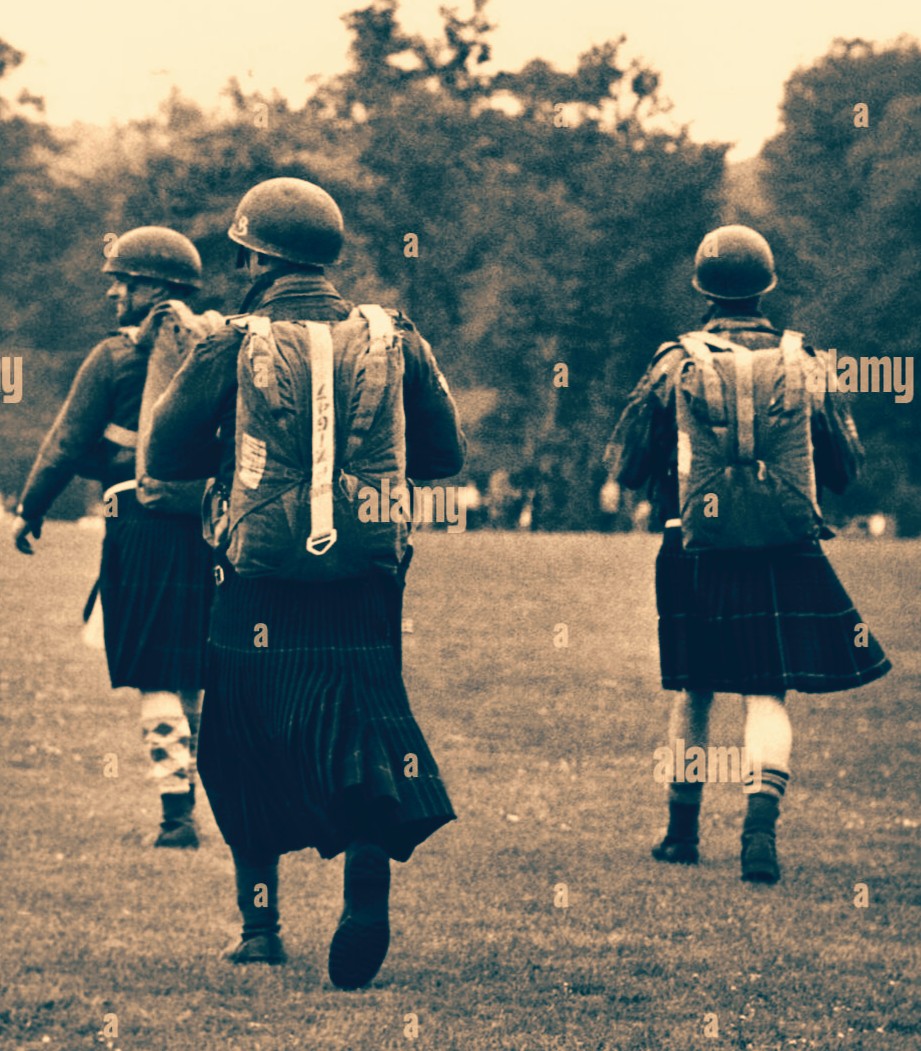The deep misogyny of British culture really comes through in a new BBC retelling of Agent Zo’s work.
First, they misleadingly say she left Britain for Poland.
The woman who left Britain to parachute into Nazi-occupied Poland
Why not say the Polish woman who returned home to lead the liberation of her country? The headline is askew from the first sentence of the piece, which clearly says she was returning to Poland.
…a woman boarded a warplane ready to return to Poland to fight the Nazis…
Next, they try to emphasize she parachuted without wearing trousers, even though she actually was wearing a flight suit. As if Scotland doesn’t have male veterans wearing skirts? As if wearing a flight suit doesn’t mean she was in trousers?
…a woman boarded a warplane ready to return to Poland to fight the Nazis, a parachute strapped to her back and a blue dress beneath her flight suit. […] Branded “the captain in a skirt”… “I quite like the line she’s the only person to parachute back from Britain to Nazi-occupied Poland in a dress because she’s the only woman to do it,” [historian Clare] Mulley says.
She’s the only person to parachute into Poland wearing a blue dress under a flight suit? We should like this minor detail because… why?
Can we believe a blue dress matters at all, or that it’s even true? Did it have dark thread or light? Was it flat front or pleated? Cotton or wool blend? Seriously, this is the kind of tiny detail distraction that the historian’s bias invokes rather than anything important to the main thread of honoring Agent Zo (yes, pun intended).
My guess would be Zo knew she had to immediately appear normal, and was dressed ready to drop and walk. That’s a reflection of occupied Poland at the time, not her own fashion sense, which speaks directly to oppression.
Did Scottish men not wear skirts when they jumped for a similar, yet opposite reason of being distinct?

I suspect this historian spent exactly no time trying to find evidence of others wearing a dress underneath their trousers, as if such a getup would make any sense without a specific reason (e.g. trying to NOT standout or be noticed, on penalty of death).
In other words, it comes across as the historian saying she loves the fact that Polish women were expected to be wearing a dress always, no matter what, or be shot on sight. What kind of person likes that?
Also repeatedly there is an attempt to unfairly brand this fearless patriot in war as being too brave or too confident.
Branded … “a militant female dictator” as she confronted those in charge in London, her efforts would transform the status of women in the Polish Home Army, helping to save thousands of lives. …you look at some of the paperwork of her friends and they said: ‘Zo came and she terrified me. I couldn’t do anything else. I had to do it.’
Some of the paperwork says her friends were terrified by her into fighting against the Nazis? That sounds like war, where unfortunately people have to be motivated by fear early to fight against the Nazis to avoid being slaughtered later without any fight.
You think Zo is the scary one? Versus the Gestapo? Funny how you live to tell that story. I guess she terrified you in the right way. Because she was right, the other option wasn’t an option at all. For a historian to say fighting Nazism was not or is not a binary choice, is for that historian to be promoting Nazism.
…she sort of blithely assumes that everyone shares her very binary world vision – they’re bad, we’ve got to free Poland. “That’s it. That’s what’s driving her.”
It was a binary world because Nazism is the most binary system. Nazis kill anyone who doesn’t agree with Hitler, or his latest whim in a state of constant improvisation and chaos. I can’t believe I have to say this. This historian even admits as much when she says Nazis were illegally killing Polish women on sight in the most binary way.
“…Hitler has got this Commando Order… he said that anyone who is found fighting not in uniform will be shot without trial,” says Mulley.
Wear a dress and dare to disagree with Hitler? Get shot without trial.
Or publicly beheaded.
Zo didn’t assume that people shared this reality. She saw truths and knew a harsh toxic reality of Nazism. She knew her friends would be shot dead in a dress sooner rather than later, if they weren’t fighting along side her to end the binary world Hitler forced women into without any choice.
Let’s also not fixate on the voice of some offended man in London who branded Zo a militant dictator, when so many others did not. I’ve run into similar issues with Orde Wingate history, as well as the talented and beautiful “Night Witches”.
Take General Patton, as an opposite canonical example, regarding how tough men can be glorified over their terrifying methods of motivation. Was Zo’s methods as bad/good as Patton? And would she ever be judged in the same way?
Agent Zo is framed unfairly by the BBC, and by spurious voices, as though her confidence and competence as a resistance fighter was a terrifying dictatorship, instead of calm, calculated competency opposed to dictatorships…. Why not tell it always from a foundational story that Zo achieved mission objectives and an absolutely essential role for the success and safety of her troops in the liberation of Poland, despite overwhelming odds against her?